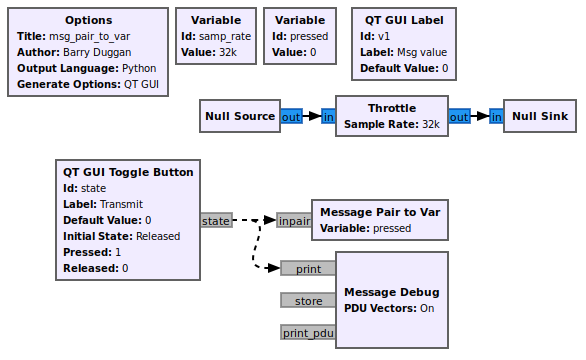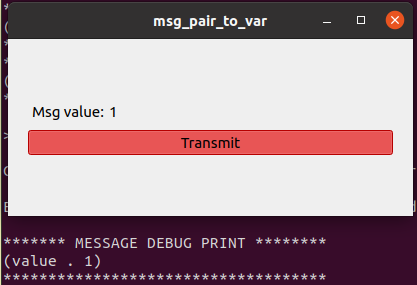Message Pair to Var: Difference between revisions
Jump to navigation
Jump to search
No edit summary |
Basti schr (talk | contribs) |
||
| Line 24: | Line 24: | ||
== Source Files == | == Source Files == | ||
; | ; Python file | ||
: [https://github.com/gnuradio/gnuradio | : [https://github.com/gnuradio/gnuradio/blob/main/gr-blocks/python/blocks/msg_pair_to_var.py msg_pair_to_var.py] | ||
; Block definition | ; Block definition | ||
: [https://github.com/gnuradio/gnuradio | : [https://github.com/gnuradio/gnuradio/blob/main/gr-blocks/grc/blocks_msg_pair_to_var.block.yml blocks_msg_pair_to_var.block.yml] | ||
[[Category:Block Docs]] | [[Category:Block Docs]] | ||
Latest revision as of 08:38, 1 September 2025
This block converts an input message pair to the value of a gnuradio variable.
Added in 3.9
Parameters
(R): Run-time adjustable
- Variable
- Name of the variable to be set. type: string; default: 'freq'
Messages
Input message pairs are of the form (<name> . <value>). For this block, <name> is ignored. The variable to be set is specified as a block parameter. More information on PMTs in general can be found in PMT Pairs.
Example Flowgraph
In this flowgraph, the input message has the name 'value' and the value of 1 or 0. The Message Pair to Var Block Variable has the value "pressed", so it sets the variable "pressed" to 1. The QT_GUI_Label displays the value of "pressed".
Example Output
Source Files
- Python file
- msg_pair_to_var.py
- Block definition
- blocks_msg_pair_to_var.block.yml

